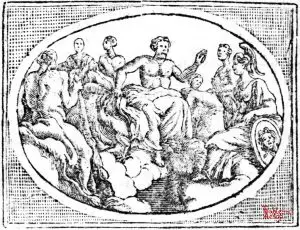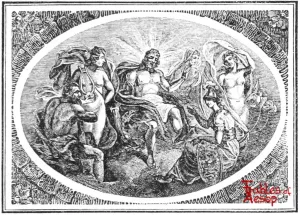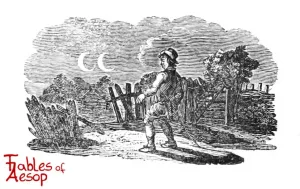Each of the gods picked a tree for protection. Minerva, wisest, picked the olive tree on account of its fruit which can be put to good use.
Do what is useful.

Townsend version
The gods, according to an ancient legend, made choice of certain trees to be under their special protection. Jupiter chose the oak, Venus the myrtle, Apollo the laurel, Cybele the pine, and Hercules the poplar. Minerva, wondering why they had preferred trees not yielding fruit, inquired the reason for their choice. Jupiter replied, “It is lest we should seem to covet the honor for the fruit.” But said Minerva, “Let anyone say what he will the olive is more dear to me on account of its fruit.” Then said Jupiter, “My daughter, you are rightly called wise; for unless what we do is useful, the glory of it is vain.”

Samuel Croxall (Jupiter and Pallas)
ONCE upon a time the Heathen gods had a mind to adopt, each a particular tree, into their patronage and tuition. Jupiter chose the Oak; Venus was pleased to name the Myrtle; Apollo pitched upon the Laurel; Cybele took the Pine, and Hercules the Poplar. Pallas being present, expressed her admiration at their fancy, in making choice of trees that bore nothing. O, says Jupiter, the reason of that is plain enough, for we would not be thought to dispense our favours with any mercenary view. You may do as you please, says she, but let the Olive be my tree; and I declare my reason for choosing it is, because it bears plenty of noble useful fruit. Upon which, the Thunderer, putting on a serious composed gravity, spoke thus to the goddess; indeed, daughter, it is not without justice, that you are so celebrated for your wisdom; for unless some benefit attend your actions, to perform them only for the sake of glory, is but a silly business.
THE APPLICATION
This fable is to put us in mind, that we should intend something useful and beneficial in all our actions. To undertake things with no other view, but that of empty glory, whatever some curious dreamers may fancy, is employing our time after a very idle, foolish manner. The Almighty created the world out of his infinite goodness, for the good of his creatures, and not out of a passion for glory; which is a vain, silly, mean principle. And when we talk of glorifying the Author of our Being, if we think reasonably, we must mean showing our gratitude to him, by imitating this goodness of his, as far as we are able, and endeavouring to make some good or other the aim of all our undertakings. For if empty glory be unworthy the pursuit of a wise man, how vastly improper must it be to make an offering of it to an All-wise Deity.

Thomas Bewick (Jupiter and Pallas)
Once upon a time, the Heathen Gods agreed to adopt each a particular tree into their patronage. Jupiter chose the Oak; Venus was pleased to name the Myrtle; Apollo pitched upon the Laurel; Cybele took the Pine; and Hercules the Poplar. Pallas being present, expressed her surprise at their fancy, in making choice of trees that bore nothing. Oh, says Jupiter, the reason of that is plain enough, for we would not be thought to dispense our favours with any mercenary view. You may do as you please, says she, but let the Olive be my tree; and I declare my reason for choosing it is, because it bears plenty of noble useful fruit. Upon which the Thunderer, putting on a serious composed gravity, spoke thus to the Goddess: Indeed daughter, it is not without cause that you are so celebrated for your wisdom; for unless some benefit attend our actions, to perform them for the sake of glory is but a silly business.
APPLICATION,
In all our actions, we should intend something useful and beneficial; for the standing value of all things is in proportion to their use. To undertake affairs with no other view but that of empty glory, whatever some curious dreamers may fancy, is employing our time after a very foolish manner. The Almighty created the world out of his infinite goodness, for the good of his creatures, and not out of a passion for glory, which is a vain, silly, mean principle; and when we talk of glorifying the Author of our being, if we think reasonably, we must mean shewing our gratitude to him, by imitating this goodness of his, as far as we are able, and endeavouring to make some good or other the aim of all our undertakings. For if empty glory be unworthy the pursuit of a wise man, how vastly improper must it be to make an offering of it to an all-wise Deity.

JBR Collection (Minerva’s Olive)
The gods, according to the heathen mythologists, had each of them their favourite tree. Jupiter preferred the oak, Venus the myrtle, Apollo the laurel, Cybele the pine, and Hercules the poplar. Minerva, surprised they should choose barren trees, asked Jupiter the reason. “It is,” said he, “to prevent any suspicion that we confer the honour we do them from an interested motive.” “Let folly suspect what it pleases,” returned Minerva, “I shall not scruple to acknowledge that I make choice of the Olive for the usefulness of its fruit.” “O daughter,” replied the father of the gods, “it is with justice that men esteem thee wise, for nothing is truly valuable that is not useful.”

Minerva et Olea
Divi olim legebant sibi quisque arborem. Quercum sibi legit Iuppiter; myrtus Veneri placuit; laurus Phoebo; Herculi populus. Minerva, rem admirata, “Cur,” inquit, “steriles arbores in tutelam sumitis?” Causam Iuppiter dixit, “Scilicet indignum deo est tutelam suam fructu vendere.” “Mihi quidem,” respondit Minerva, “olea gratior est propter fructum.” Tum Pater deorum atque hominum “O nata,” inquit, “merito sapiens esse diceris. Stulta enim est gloria, nisi id, quo gloriamur, utile est.”
Perry #508


